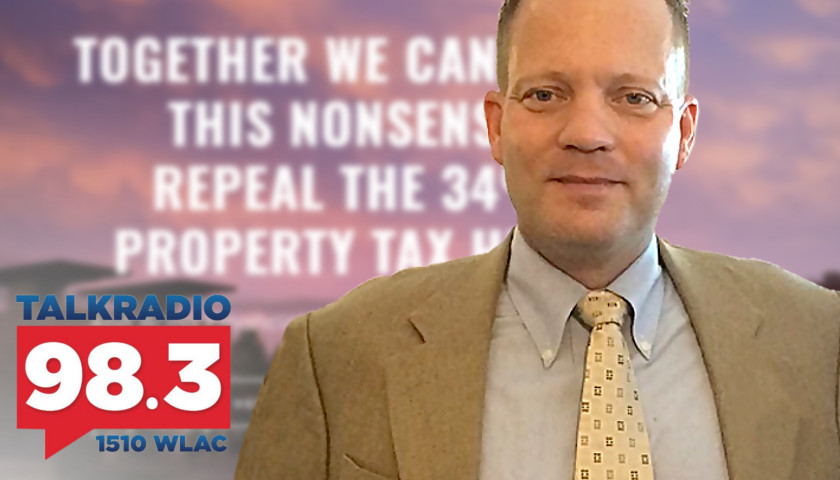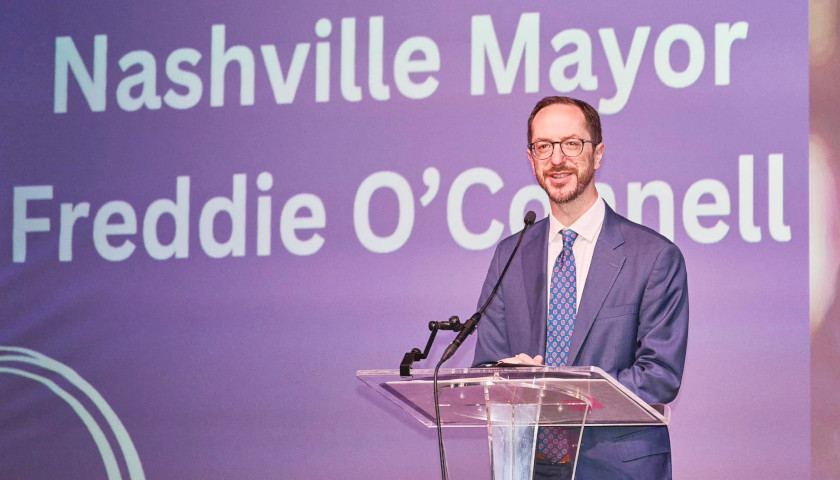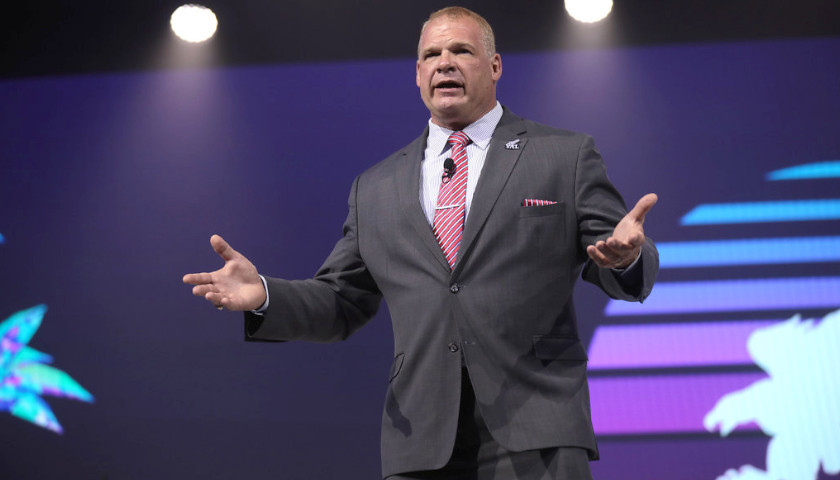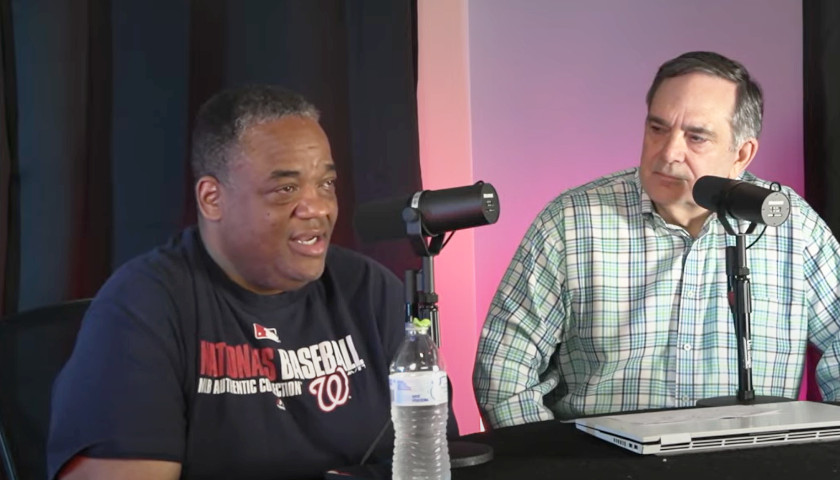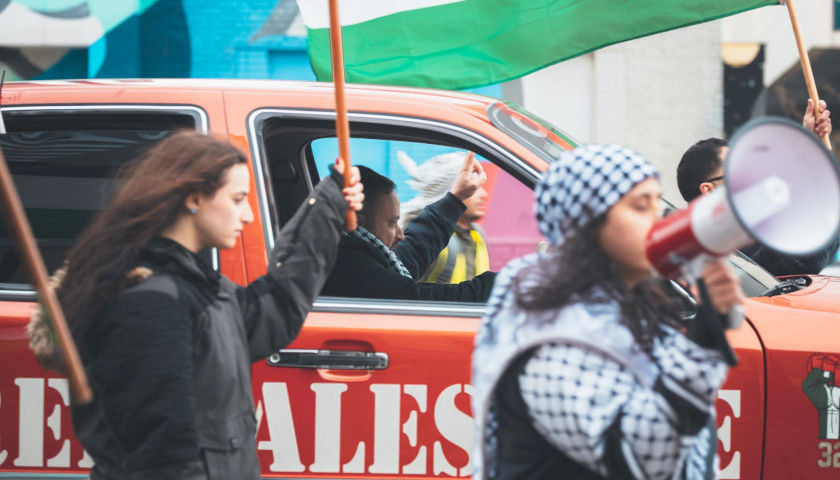Live from Music Row Monday morning on The Tennessee Star Report with Michael Patrick Leahy – broadcast on Nashville’s Talk Radio 98.3 and 1510 WLAC weekdays from 5:00 a.m. to 8:00 a.m. – host Leahy welcomed Nashville attorney Jim Roberts to the newsmakers line.
During the third hour, Roberts gave updates to the number of petitions received thus far for the Nashville Taxpayer Protection Act needed to get on the ballot by December third. He also detailed what the Act would do and urged listeners to continue to help get more signatures.
Leahy: We are joined now on the line by our very good friend Jim Roberts an attorney fighting for good causes all the time here in Nashville and heading up the Nashville Taxpayer Protection Act program. Jim welcome to the Tennessee Star Report. I’m in the studio here with Crom Carmichael.
Roberts: Good morning gentlemen. How are you all doing this beautiful day?
Carmichael: Yes. Well, Jim give us an update.
Roberts: Well things are going great. Petitions are rolling in. We picked up about 2,500 which came in last week. We are getting close to about 8,000 signatures and trying to push ourselves up to 15,000 before we turn them in. We have another 60 days to gather signatures. We are very confident that we have enough to get on the ballot. We just want to make sure we are safely on the ballot.
Leahy: And remind everybody about the key element of when you turn in these petitions. You are going to turn in about 15,000 in the next couple of weeks. You have to get 6,500 to get on the ballot. Tell us what you are asking for on the ballot.
Roberts: OK. This is called the Nashville Taxpayer Protection Act. And its idea is to protect the citizens from some of the government overreaches. This 34 percent tax increase that was forced upon the citizens to make up for mismanagement is going to be rolled back.
The number one thing it does is roll back that 34 percent tax increase to two percent. It prohibits the use of bond funding for extravagant projects. It’s going to protect our parks, greenways, and our public land from being given away. The idea is to have fiscal responsibility from Metro which is something that’s been lacking honestly for a long time.
Carmichael: Are these a series of different questions that will appear on a ballot or is it all under one question?
Roberts: It’s going to be just one single amendment. It was designed that way. The idea was to just sort of put the guard rails around the Metropolitan government on what they can spend and try to reign them in a little bit We’ll come back years later to do more with these protection acts to solve other problems.
But right now we were just worried about the uncontrolled spending. We’ve had 10 years of surplus of great times in Nashville and basically its been one long party for the government because at the end of a decade we have nothing to show for it.
Carmichael: So this will be a ballot amendment so people will be able to go to the polls sometime in early December and they’ll vote on a number of things but all under one question. If you vote yes does it mean that you win?
Roberts: That’s correct.
Carmichael: So if people vote yes then it constrains. This is what we talk about Michael on the show about governments’ needing to have institutional constraints that keep them from spending more money than they should. And in Metro, there isn’t that institutional constraint on the tax side.
So this is using the democratic process to determine whether or not the voters think a 34 percent tax increase is good for them and good for the city. And it’s just that simple. And the alternative Jim is if the majority vote yes, then the 34 percent reverts to a two percent. Is that correct?
Roberts: That’s correct.
Leahy: Well that sounds like good news. It looks like Jim that the standard that you’re going to have to meet to get on the ballot in December is about 6,500 votes or somewhere in that range depending on the primary outcome?
Roberts: It really is based on how many people vote on August sixth. Early voting has been a little high. We don’t know if that’s due to COVID or other factors. We’re betting that we’re probably going to need 5,000 or 5,500 signatures to be on the ballot. We just want to be extra careful because we know that the Metropolitan government will work to do everything they can to disqualify as many signatures as possible. So you want to have more than you need.
Carmichael: But if you turn in 15,000 that you think you’ll do and the standard is you’ve got to beat 5,000 or 5,000 it’s going to be very difficult to throw out 9,000 signatures it would seem to me.
Leahy: Well, that’s the plan. And you are absolutely right. The concern is that they will nitpick but if you overwhelm them they won’t even try that.
Carmichael: So if people want to sign a petition they go to your website which is 4GoodGovernment.com. They can print off the petition and they can sign it. And by the way, they need to sign it with the name that’s on their voter card.
Roberts: Absolutely. And it says that on there. You need your full name and your address and you have to be a Davidson County registered voter for it to count.
Carmichael: So for those people that think this ought to be voted on by the citizens then go to 4GoodGovernment.com and when you print it out pull out your voter registration card and be sure you put your name down exactly as its written on the voter registration card and the address as it is listed on the voter registration card. Jim, good luck to you.
I think democracy is a good thing. And I think with something this huge I think it’s a very good thing that the voters will be able to weigh in on it. And I hope you do get to 15,000 to 20,000 ballots. One last thing. The lawsuit that was brought against the folks who were trying to do the recall, you were listed in that. Where does that stand and were they inaccurate in listing you?
Roberts: They were inaccurate in listing me. Unfortunately, I see this as a modus operandi by the people who are going to be opposed to this fact but the people who did the recall effort I have a lot of admiration for. They were kind enough to gather some signatures for me.
I sadly really had nothing to do with them because mostly I’ve been tied up in litigation. Everything in that indicates that they are just desperate. I should have expected it. I’m not worried about it. I suspect it will go away. It’s one of those election year type things. It will go away in about two or three weeks. The whole purpose of that was to make headlines for a couple of days and they got their 15 minutes of fame over it.
Leahy: It’s kind of abuse of the legal process it seems to me.
Roberts: It is. In politics, people file lawsuits all the time just to gain news media more than any sort of legal remedy. I’m looking into what I might do. But really I don’t want to waste my life chasing political hacks.
Leahy: (Chuckles) That’s wise advice. That’s wise advice because you’d be spending all your time reacting to political hacks.
Carmichael: Good luck. And for those that want to have a chance to vote on this question go to 4GoodGovernment.com.
Leahy: They can also use NashvilleTaxpayerProtectionAct.com.
Roberts: That’s the easiest to remember or you can Google it. NashvilleTaxpeyerprotectionAct.com will get you right there. I’d like to ask the listeners not just to sign it themselves but to get other people to sign it. That’s really what helps. Help me gather signatures and our volunteers.
Leahy: So if you get on the ballot which you should if this is a fair deal and they’re not playing tricks at Metro Nashville government the voters will have a chance to vote up or down on this in early December. My guess is they will say we don’t want to spend a 34 percent increase in taxes. So then after that, the city government will have a problem. They could raise taxes again but they’d have to go back to the voters. Is that right?
Roberts: That’s right. Nothing prohibits Mayor Cooper from going to the people and saying we really really need a tax increase. But he’ll have to expend some of his political capital. We already know that 34 percent is not necessary because the tax revenues in the first quarter of this year came up a lot higher. If they had known what the tax revenues would have been 14 percent rather than 34 percent. So we already know that 20 percent can come right off the top just based on tax revenues.
Carmichael: How is the local news media treating you?
Roberts: (Chuckles) I guess I’m lucky when they don’t mention me at all or they lie about me and get the story wrong.
Leahy: Well, we will tell the truth about you here at the Tennessee Star Report and the Tennessee Star, Jim.
Listen to the full third hour here:
– – –
Tune in weekdays from 5:00 – 8:00 a.m. to the Tennessee Star Report with Michael Patrick Leahy on Talk Radio 98.3 FM WLAC 1510. Listen online at iHeart Radio.

